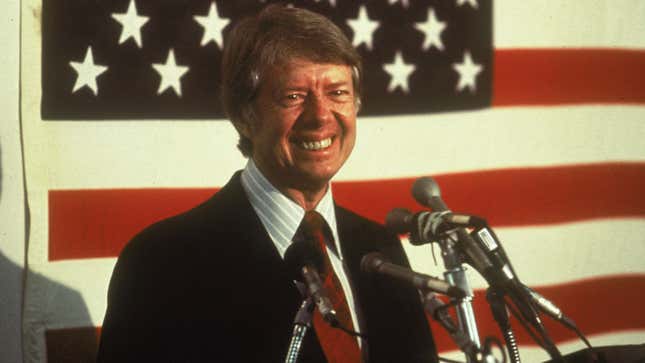
A few years ago, I spoke with civil rights icon Andrew Young and in my conversation, I asked him about being appointed U.S. Ambassador to the United Nations. He told me that his international perspective came from the people from the Black diaspora that he met through the Black church.
It was a perspective he was able to lend because of the vision of his friend Jimmy Carter, the 39th president of the United States, who died Sunday at 100. Young was appointed to the role by Carter in 1977 and served until 1979, the first African American in the position.
Carter will be remembered by his supporters as a statesman, the president who got the country past the Watergate scandal, an advocate for peace and diplomacy and a politician who actually embraced Christian values while in office and throughout his life. His critics — mainly right-wingers who have always hated him — will remember late 1970s inflation, high gas prices, job loss and the Iran hostage crisis.
But Black people old enough to remember won’t forget that he was the first major politician to listen to Black people, loudly call for an end to racism, and mean it. People do give John F. Kennedy and Lyndon Johnson credit for their actions during the 60s, but Carter, in his 1970 gubernatorial inaugural address turned a corner – likely after being criticized for seeking endorsement from some Georgia segregationists.
“The time for racial discrimination is over,” he said. “No poor rural white or black person should ever have to bear the additional burden of being deprived of the opportunity of an education, a job or simple justice.”
It pissed the segregationists off something awful. Former Georgia Gov. Lester Maddox, a loud and proud racist was so mad that he tried to spit venom at him through his 1976 presidential campaign. George Wallace, maybe the best-known segregationist of all time, fell flat in the 1976 Democratic primary race. These men echoed a dying racist narrative that demanded Black people remain powerless. We’ve been working feverishly to prevent its resurrection ever since.
Carter, who espoused a progressive Civil Rights policy, working as a state senator to get rid of discriminatory voting laws, increasing Georgia state staff members by a reported 25 percent, and in his presidency appointing not only Young but Patricia Roberts Harris, the first Black woman to serve as U.S. Department of Housing and Urban Development secretary, and a record 37 Black federal judges.
In the end, Carter did not get his final political wish — to see Vice President Kamala Harris elected president. He cast his vote by mail in October, telling a relative that he was “only trying to make it to vote for Kamala Harris,” according to his grandson Jason.
But he did live to see a Black America that is radically different than when he first entered politics. Political change for us did happen because he was a politician who ultimately made anti-racism a feature of his policies. After him, anyone running for president could not ignore us.
For that, we owe Jimmy Carter our thanks and appreciation.
———-

